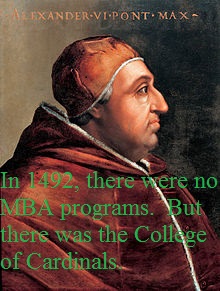Machiavelli’s Role Model
Posted in General, On This Day on August 11th, 2016 by Eugene Finerman – Be the first to comment Donald Trump could have warned the College of Cardinals about cheap Hispanic labor. However, on this day in 1492, the College elected Roderigo Borja as Pope. Obviously, the Italian boys were not so eager to have the job. Their bribes were only half as much as Roderigo’s, and Roderigo was willing to assimilate. His mistresses were Italian, and he even adopted a more Italian pronunciation of his surname: Borgia. (But his green card would have identified him as Pope Alexander VI.)
Donald Trump could have warned the College of Cardinals about cheap Hispanic labor. However, on this day in 1492, the College elected Roderigo Borja as Pope. Obviously, the Italian boys were not so eager to have the job. Their bribes were only half as much as Roderigo’s, and Roderigo was willing to assimilate. His mistresses were Italian, and he even adopted a more Italian pronunciation of his surname: Borgia. (But his green card would have identified him as Pope Alexander VI.)
But as Donald Trump could have warned them, you let one of them in….Yes, Roderigo had a big family; and with six children, a Pope can’t get by just from skimming the profits of bingo nights. His daughter Lucretia was attractive, so he had no trouble arranging three lucrative marriages for her–and he oversaw her becoming a widow in time for the next marriage. (Annulments took too long, even for a Pope’s daughter.) Then, there was the irrepressible Cesare. Dad made him a cardinal when Cesare was 17, but the boy showed secular interests: murder, pillage and conquering all of Italy. Well, Roderigo could hardly refuse his son (especially if the son might kill him), and the Pope actually liked the idea of Italy as a family heirloom.
Such a conquest was, however, a rather daunting goal. The Italian city states were always at war, but the wars barely amounted to misdemeanors. Ferrara would seize an acre from Rimini, and Rimini might retaliate by defacing a fresco. And the Papal States definitely were not supposed to attack anyone. But Roderigo was not much for etiquette. (For instance, he referred to his children as his children; every other pope pretended that his spawn were only nephews and nieces.) He invested Cesare with the full military resources of the Papal States (Stop laughing; you could buy a lot of mercenaries with purloined Church funds.) But, yes, that would not be enough to quickly conquer the peninsula.
Fortunately, the Pope was a man of faith: he fervently believed in his own craftiness and everyone else’s gullibility. So, Roderigo encouraged the King of France to invade Italy. Once the French invaded in 1494, the Pope then began encouraging Spain to defend its possessions in Southern Italy. Roderigo was even negotiating with the Ottoman Empire. Somehow, he expected to play everyone off against each other and end up with all of Italy. He might have even succeeded but for one miscalculation. Seventy-year-old men have a tendency to die, and in 1503 men usually died at 45. Roderigo had beaten the actuarial table but he couldn’t do it indefinitely. Without Dad, Cesare was without an empire and Lucretia was stuck in her third marriage.
Nonetheless, Roderigo definitely left an legacy. The name Borgia is still remembered. And Spain, allied with the Holy Roman Empire, would be fighting France over the control of Italy for another 30 years. In fact, the Papacy and the Holy Roman Empire were so preoccupied with Italian politics that when a German theology professor complained about the Church’s corruption, no one paid any attention to Martin Luther (except the population of Northern Europe).